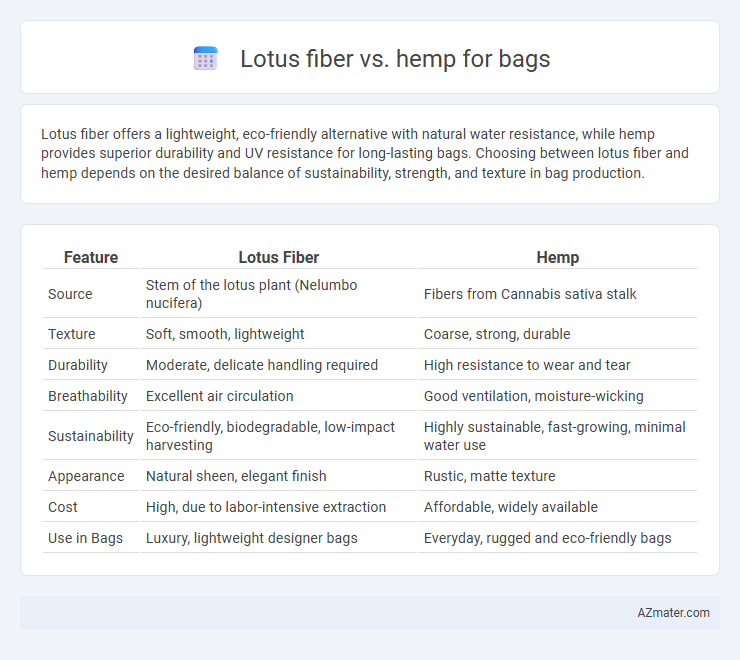Lotus fiber offers a lightweight, eco-friendly alternative with natural water resistance, while hemp provides superior durability and UV resistance for long-lasting bags. Choosing between lotus fiber and hemp depends on the desired balance of sustainability, strength, and texture in bag production.
Table of Comparison
| Feature | Lotus Fiber | Hemp |
|---|---|---|
| Source | Stem of the lotus plant (Nelumbo nucifera) | Fibers from Cannabis sativa stalk |
| Texture | Soft, smooth, lightweight | Coarse, strong, durable |
| Durability | Moderate, delicate handling required | High resistance to wear and tear |
| Breathability | Excellent air circulation | Good ventilation, moisture-wicking |
| Sustainability | Eco-friendly, biodegradable, low-impact harvesting | Highly sustainable, fast-growing, minimal water use |
| Appearance | Natural sheen, elegant finish | Rustic, matte texture |
| Cost | High, due to labor-intensive extraction | Affordable, widely available |
| Use in Bags | Luxury, lightweight designer bags | Everyday, rugged and eco-friendly bags |
Introduction to Lotus Fiber and Hemp
Lotus fiber, derived from the stalks of lotus plants predominantly found in India and Myanmar, is renowned for its ultra-soft texture and eco-friendly properties, making it a premium choice for sustainable bags. Hemp, cultivated globally and valued for its durability and high tensile strength, offers robust fibers that contribute to long-lasting and resilient bags. Both materials provide natural, biodegradable alternatives to synthetic fabrics, with lotus fiber prized for its luxury appeal and hemp favored for its environmental benefits and versatility.
Origins and Cultivation
Lotus fiber originates from the stem of the lotus plant, primarily cultivated in Southeast Asia, where it thrives in aquatic environments requiring minimal pesticides and fertilizers. Hemp comes from the Cannabis sativa plant, widely grown across Europe, China, and North America, known for its fast growth, high yield, and low environmental impact due to its ability to improve soil health and resist pests naturally. Both fibers offer sustainable alternatives, but lotus fiber's unique extraction process contrasts with hemp's large-scale agricultural production.
Sustainability and Environmental Impact
Lotus fiber and hemp both offer sustainable alternatives for bag production, with hemp known for its fast growth, low water requirements, and ability to improve soil health through phytoremediation. Lotus fiber, derived from the lotus plant's stem, is highly biodegradable and requires minimal chemical processing, making it an eco-friendly choice with a small carbon footprint. While hemp's durability and pest resistance contribute to long-lasting products, lotus fiber's renewable harvesting cycle and natural antibacterial properties reduce environmental impact throughout the bag's lifecycle.
Fiber Extraction Process
Lotus fiber extraction involves a labor-intensive process where lotus stems are harvested, crushed, and soaked to separate long, fine fibers known for their softness and sheen, making it eco-friendly but costly. Hemp fiber extraction typically uses mechanical decortication to remove the outer bark, followed by retting processes that yield strong, durable fibers ideal for sturdy bags with high tensile strength. Both methods emphasize sustainability, but lotus fibers require more manual labor and water immersion, whereas hemp benefits from scalable industrial processing.
Durability and Strength Comparison
Lotus fiber offers a unique balance of lightweight feel and moderate durability, making it suitable for eco-friendly bags that prioritize aesthetics and breathability. Hemp fibers, however, generally exceed lotus fiber in tensile strength and abrasion resistance, resulting in longer-lasting bags that withstand heavy use and harsh conditions. Choosing hemp enhances bag longevity and structural integrity, while lotus fiber contributes to sustainable and visually appealing designs.
Texture and Aesthetic Qualities
Lotus fiber offers a unique, smooth texture with a subtle sheen that creates an elegant and refined appearance, making it ideal for luxury bags. Hemp provides a coarser, more durable texture with a natural matte finish that emphasizes ruggedness and eco-friendly aesthetics. The choice between lotus fiber and hemp hinges on whether a soft, polished look or a robust, rustic style is desired for the bag's design.
Cost and Market Availability
Lotus fiber is generally more expensive than hemp due to its labor-intensive extraction process and lower yield per plant, limiting its mass production. Hemp offers greater market availability, supported by established cultivation and processing infrastructure across multiple regions, making hemp bags more accessible and cost-effective. The higher production costs and limited supply chain of lotus fiber contrast with hemp's scalability and widespread adoption in sustainable bag manufacturing.
Performance in Bag Manufacturing
Lotus fiber offers exceptional tensile strength and a smooth texture, making it ideal for lightweight, durable bags with a luxurious feel. Hemp fibers provide superior abrasion resistance and natural mold-inhibiting properties, enhancing bag longevity in rugged conditions. Both fibers are eco-friendly, but hemp's faster growth rate and higher fiber yield optimize cost-efficient bag production.
Consumer Preferences and Trends
Consumers increasingly favor lotus fiber for bags due to its eco-friendly production and unique texture, appealing to sustainability-conscious buyers. Hemp remains popular for its durability and natural resistance to wear, attracting those seeking long-lasting, functional accessories. Market trends indicate a growing demand for lotus fiber in luxury and artisanal segments, while hemp dominates in affordable, everyday bag options.
Final Verdict: Which Fiber is Better for Bags?
Lotus fiber offers exceptional softness and natural sheen, making it ideal for high-end, lightweight bags, while hemp provides greater durability, strength, and resistance to wear, perfect for rugged and long-lasting bags. Hemp's eco-friendly cultivation with minimal pesticide use and faster growth cycle also ensures a more sustainable production compared to the labor-intensive extraction process of lotus fiber. For bags requiring a balance of toughness and sustainability, hemp is the better fiber choice, whereas lotus fiber suits luxury bags prioritizing texture and aesthetic appeal.

Infographic: Lotus fiber vs Hemp for Bag
 azmater.com
azmater.com